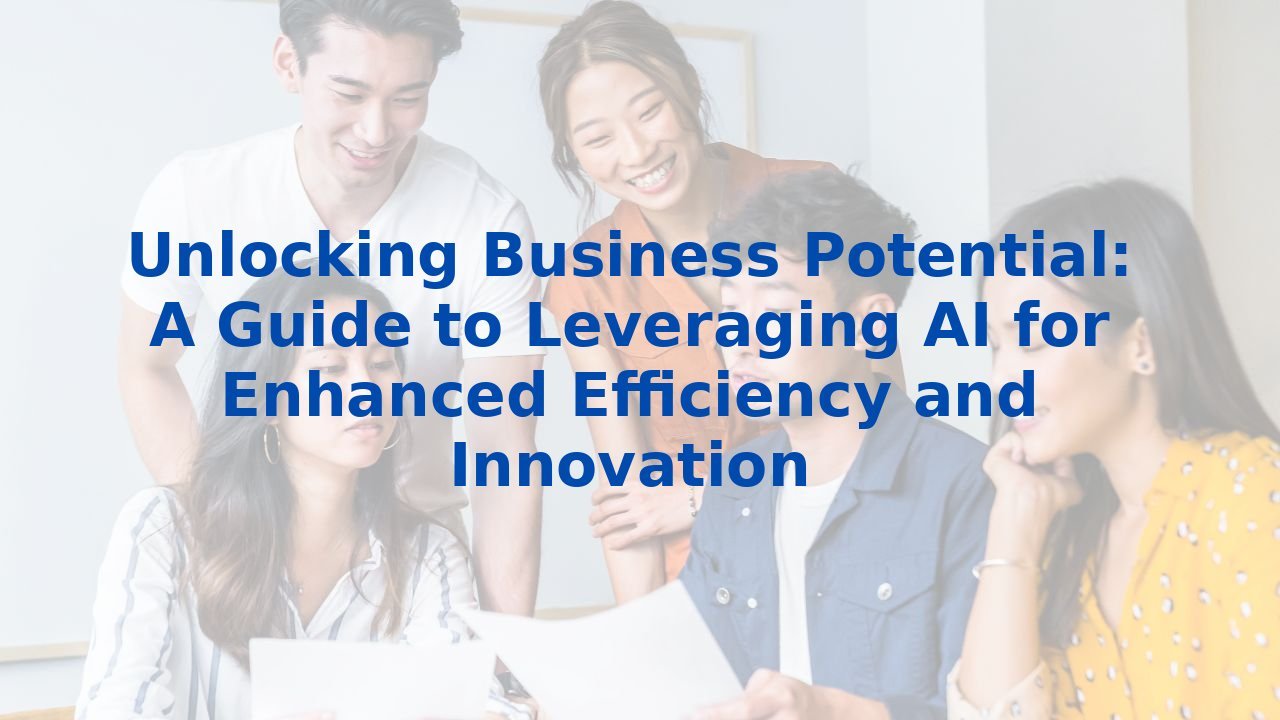Unlocking Business Potential: A Guide to Leveraging AI for Enhanced Efficiency and Innovation
Unlocking Business Potential: A Guide to Leveraging AI for Enhanced Efficiency and Innovation
In a world where competition is fierce and the pace of change is relentless, businesses are constantly searching for ways to boost efficiency and drive innovation. Enter Artificial Intelligence (AI), a powerful tool that reshapes the very fabric of business processes. This guide explores how organizations can leverage AI to enhance their operations and the essential role of employee training in this transformative journey.
Redefining Business Processes with AI
AI is not simply a buzzword; it is a transformative force that redefines how businesses operate. By integrating AI into various aspects of their processes, businesses can not only enhance their efficiency but also unlock new avenues for profitability. Here are several key areas where AI is making a significant impact:
1. Automation and Operational Efficiency
One of AI's most profound benefits is its ability to automate repetitive and rule-based tasks. By relieving employees from time-consuming duties such as customer service requests, insurance claims processing, and back-office administration, AI enables them to focus on higher-value activities. This shift not only enhances operational precision and consistency but also reduces the risk of human error, fostering a more efficient workplace.
2. Advanced Data Analytics
In an era where data drives decisions, AI stands out for its ability to analyze vast amounts of information at lightning speed. Organizations leveraging machine learning algorithms and natural language processing can extract valuable insights, detect patterns, and predict outcomes with unprecedented accuracy. This data-driven approach empowers businesses to refine strategies, optimize costs, and enhance supply chain management, ensuring they remain responsive to market demands.
3. Customer Experience Personalization
AI transforms customer interactions by enabling businesses to offer personalized experiences. With the help of intelligent chatbots, organizations can provide accurate and timely responses, tailored to individual preferences. This level of personalization fosters stronger relationships with customers, leading to increased loyalty and retention over time. Ultimately, businesses that prioritize the customer experience through AI will not only survive but thrive in a competitive landscape.
4. Security and Risk Management
In a digital era where data breaches are alarmingly common, AI plays a crucial role in bolstering security and compliance. Advanced AI systems can swiftly detect cyber threats, monitor suspicious behaviors, and prevent fraud while ensuring adherence to regulatory standards. By automating these processes, organizations can significantly reduce the risks associated with data security, allowing them to focus more on growth and innovation.
5. Innovation and Product Development
AI not only enhances existing operations but also speeds up innovation. From design to production, AI optimizes development cycles and can even anticipate market demands with remarkable accuracy. In industries like healthcare, where rapid innovation is essential, AI can accelerate processes like drug screening and molecular design, positioning companies at the forefront of their fields.
The Benefits of Training Employees for AI
While AI automates many processes, it thrives on effective human oversight and strategic decision-making. This makes employee training a cornerstone of maximizing AI's benefits. Here’s why investing in training is crucial:
- Understanding AI Capabilities: Employees must grasp AI's mechanics and potential applications to identify opportunities for integration and improvement in workflows.
- Data Interpretation: As AI generates extensive data, employees need to develop skills for interpreting insights and using them for informed decision-making.
- Collaboration with AI Systems: Training ensures staff can collaborate effectively with AI tools, retaining the human touch while leveraging AI’s accuracy and efficiency.
- Adaptability: The rapid evolution of AI technologies demands that employees remain adaptable and ready to learn new skills, fostering a culture of growth and continuous improvement.
By investing in comprehensive training programs, organizations empower their workforce to harness AI effectively, leading to enhanced operational efficiency and innovative breakthroughs.
Conclusion
AI is revolutionizing business processes, enabling organizations to enhance efficiency and foster innovation. Whether through automation, advanced analytics, or personalized customer experiences, the integration of AI is essential for staying competitive in today’s market. By embracing AI across their business operations and fostering a culture of continuous learning among employees, organizations position themselves not only for success today but also for a thriving future in an increasingly digital landscape. For those ready to embark on this transformative journey, comprehensive training programs can provide the necessary skills and knowledge to maximize AI's potential.



